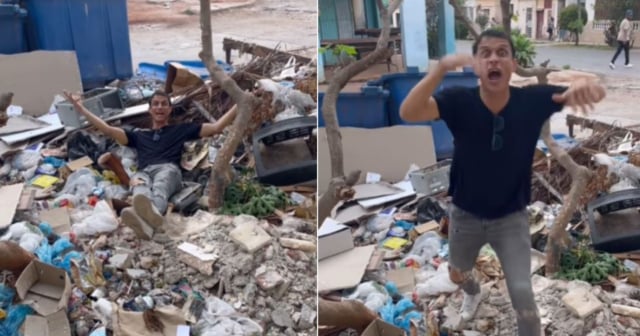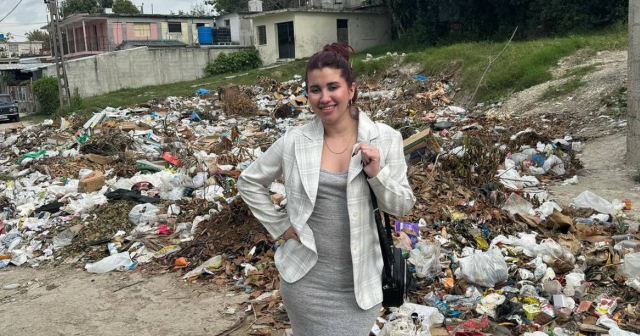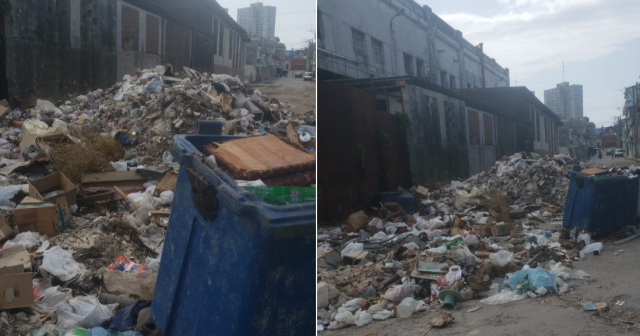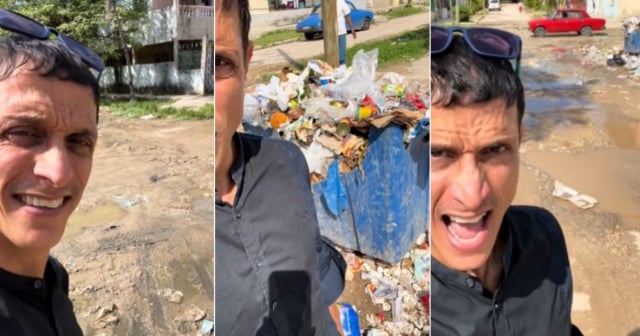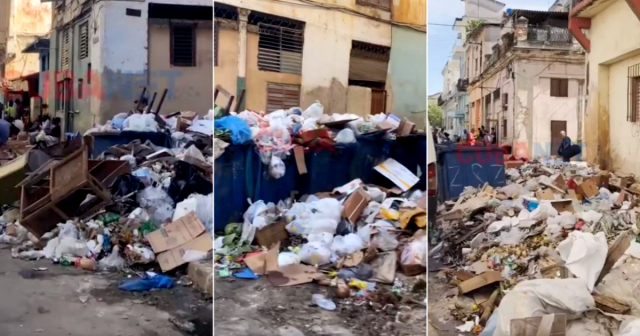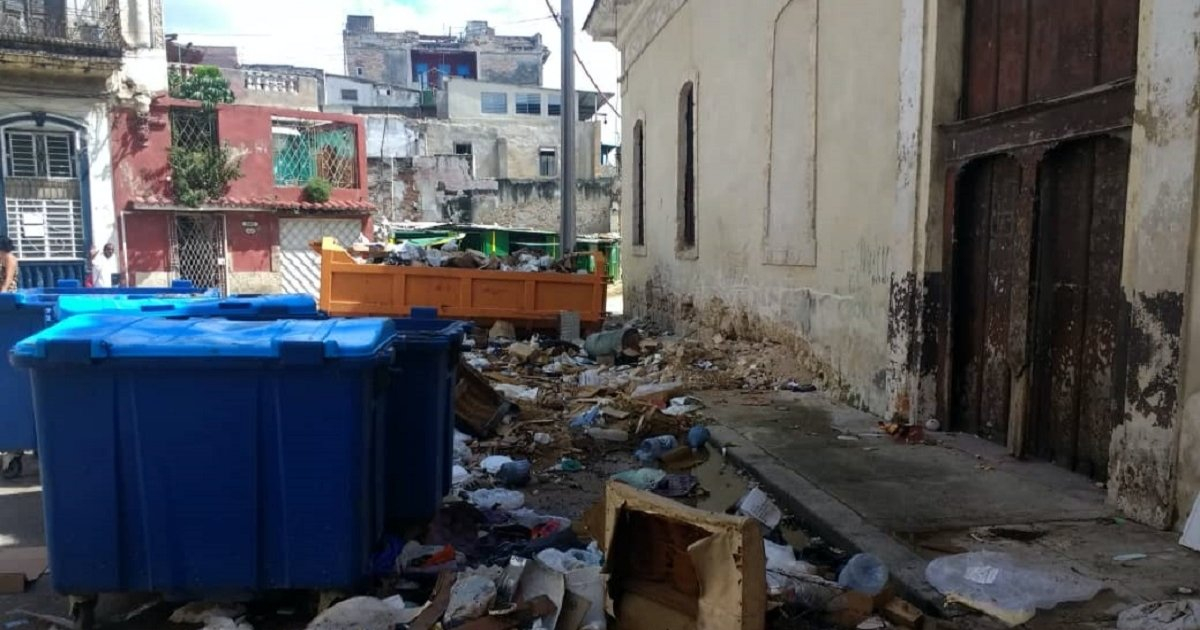
Magazine Alma Mater published an article this Friday in which it reflected the problems of garbage collection in the capital, as well as the deficiencies of communal services, incapable of "transferring" the volume of waste generated in the Cuban capital.
Havana residents generate 24 thousand cubic meters of garbage daily, including organic and inorganic waste and other types, including toxic waste. “The community services of the country's capital have never been able to transfer so much detritus. They are not enough,” indicated the publication of the Federation of University Students of Cuba (FEU).
The 13,000 communal workers who average work in the capital are not enough to deal with the garbage generated by Havana's 2,132,394 inhabitants.
Nor are the 80 collection trucks assigned to the Havana municipalities sufficient, nor “the 40 dump trucks, 15 mini-loaders, 50 motor pruners, 25 chainsaws for pruning actions and 15 vans intended for the control and supervision of the processes by the municipal addresses,” he said. Alma Mater.
Also in deficit are “the ampliroll boxes [containers] located for the deposit of debris in each of the 105 Popular Councils of the capital, mainly in peripheral areas.”
However, despite recognizing the lack of human and material resources of the capital's communal services, the publication pointed out social indiscipline as one of the factors that most impacts the dirtiness of the capital's streets.
“The city looks dirty in many parts, especially where the influx of public is massive and social discipline shows little willingness to contribute, at least, to making the streets less messy than there is,” the magazine considered in an article. who contrasted this situation with the cleaning of neighborhoods “where the personnel dedicated to street sweeping are scarce and with fewer resources.”
“It will be said that they are neighborhoods where pedestrian and vehicular traffic is much less,” he surmised. Alma Mater, appreciating lights and shadows in municipal waste management. "In theory, the structure works that in each of the 15 municipalities of the capital there is its own Community Company, aiming to territorially integrate resources, personnel and efforts dedicated to this sanitation work."
However, “let's look around,” proposed the FEU magazine. “Not the entire city looks the same; not all collector/compactor trucks pass, or pass on time; Not all those directly linked to the collection wear their corresponding uniform module; Not everyone in the neighborhood takes domestic garbage, at their time and in their place,” he added, distributing the responsibility between some municipal Communal Companies and the residents of the capital themselves.
“Sustainability is complicated. We all know that it is not that simple, for obvious reasons. Social, civic, or urban conscience, some call it or simply decency, according to the majority," defined the magazine, which gave as an example the civility of "first world countries."
In them, "resources for their communal services abound, but no one dares to surreptitiously or openly throw away a can of soda or beer, not even the wrapper of a minimum of candy," the magazine stated.
The situation with the collection and processing of garbage in the capital has been a cause of complaint by Havana residents. The Almendares and Quibú rivers They have been the subject of several campaigns to collect waste from their shores and riverbanks, but the situation is not resolved and is repeated over time.
In December 2019, the Provincial Council of Granada donated monetary aid to the Centro Habana municipality for garbage collection. According to its official website, the aid will be used to "improve the hygienic-sanitary conditions of the municipality of Centro Habana through the efficient management of the urban solid waste collection system."
In March 2020, Cuba's Secret Nature page shared an aerial view of the controversial garbage dump on 100th Street in Havana, in which smoke emissions could be seen invading the neighborhoods near the capital's large landfill, which often cause numerous complaints from the population.
According to the page, the landfill is “one of the challenges that Havana has to achieve better environmental hygiene in the city. It is not enough to collect solid waste better in each neighborhood, an also sensitive problem is what to do with it later.”
"Not infrequently, Cuba has dreamed of converting these spaces into a source of energy generation and, at the same time, reducing the pollution they cause today. To this end, this possibility has been incorporated into the portfolio of foreign investment projects, which are so It is difficult to materialize in the face of so many external pressures; but we cannot give up our efforts to transform this reality,” he added.
"More than 250 thousand residents in the Havana municipalities of Marianao and La Lisa were subjected to toxic smoke resulting from the self-combustion of the garbage dump on Calle 100, known as El Bote," a situation that a citizen also reported in March 2020, and which this Friday's Alma Mater article does not mention.
As he explained, the burning of garbage there causes “a suffocating and fetid fog that causes coughing, a feeling of suffocation and discomfort in the eyes; This in the long term translates into chronic respiratory conditions such as pneumonia, asthma, bronchitis and lung cancer,” among other evils.
What do you think?
SEE COMMENTS (1)Filed in:

